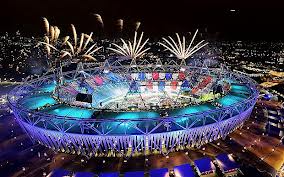By Paul Nicholson
November 21 – The remodelling of London’s 2012 Olympic Stadium in preparation for occupancy by Premier League club West Ham United started in earnest yesterday with the removal of the stadium floodlights in preparation for a cantilevered roof. At the same time a report from the House of Lords suggested that Football League Division 1 club Leyton Orient should be allowed “occasional” use of the stadium.
“Occasional” use is not likely to be much use for Leyton Orient owner Barry Hearn who has argued that his club is the closest to the stadium and they should be allowed to groundshare the public facility. The benefits of “occasional” appear hard to solidify into a long term commercial strategy for the club.
While the House of Lords report is only that (a report that has no legal weight) it will cause some discomfort to London Legacy Development Corporation (LLDC) as it is clear in its conclusion that it is unconvinced that current plans will utilise the stadium to its fullest.
Hearn was cut out of any kind of tenancy following the tender process which opted for West Ham exclusively – West Ham have expressed no interest in sharing anything with their near neighbours.
Hearn argues that the Premier League club have been gifted the £600 million pound stadium (now undergoing a further £160-200 million conversion) which is a public asset. West Ham are contributing £15 million to the refit and will pay about £2 million per year in rent.
West Ham is a privately owned business with revenues on excess of £100 million a year. With a long term tenancy at the Olympic stadium the value of the club increases significantly and Hearn reckons it would be trophy asset for an overseas investor looking to buy into the Premier League.
The LLDC is clear that there will be no re-opening of the tender process and that as far chief executive Denis Hone is concerned, the case is closed, decision made.
“Mr Hearn’s stated position is that they want to look at groundshare. His letter to me reiterates that. It goes further than occasional use and talks about groundshare. We’ve had two detailed competitions. The process was robust and transparent. We’re not going to do anything that reopens those competitions or leads to a rerun,” said Hone.
Hearn took the LLDC decision to judicial review but failed. But he may find some support from the EU who have been examining the use of public money in football stadia across Europe, and also responding to complaints from Europe’s elite clubs that top Spanish teams have continually been bailed out by state money, giving them an unfair advantage in European competition.
Certainly the House of Lords have raised more questions than answers again about the London Olympic legacy, use of public money and the deal done between the LLDC and West Ham.
Lord Harris, who chaired the House of Lords committee, said: “We think it may be possible for it to work in a different way but it has got to be economically viable. You can’t open up a huge stadium if there are not enough people going in it to be worthwhile. The most effective use of the stadium has to be in the national interest.”
Perhaps the key words here are in “the national interest” and how this is defined. Certainly in this dispute there is confusion, despite the clear ruling of the judicial review of the original decision.
The revamped 54,000-seat Olympic stadium will be turned over to West Ham in time for the 2016/17 season and after the Rugby World Cup 2015. West Ham is currently marketing stadium naming rights for which they claim there has been a lot of interest.
Contact the writer of this story at moc.l1735881984labto1735881984ofdlr1735881984owedi1735881984sni@n1735881984osloh1735881984cin.l1735881984uap1735881984

